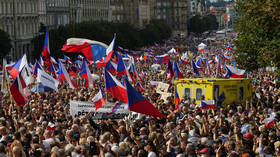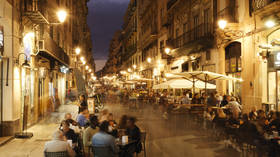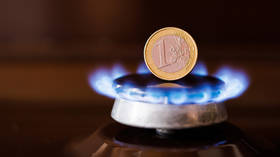Winter is coming: Prague’s 70,000-strong protest shows what’s in store for Europe
The recent demonstration saw Czechs rally against NATO and the EU amid a looming energy crisis

Around 70,000 people gathered in Prague’s Wenceslas Square on Saturday to demand the resignation of their government in response to what they see as a failure to address the ongoing energy crisis. The protesters were also explicitly against the two foremost Western institutions that the formerly Eastern-aligned nation is a part of, namely the European Union and the North Atlantic Treaty Organization (NATO).
If you ask Prime Minister Petr Fiala of the Civic Democratic Party (ODS) what the problem is, he’d simply say that these tens of thousands of people are just unknowing pro-Russian stooges. To quote him verbatim, he said “the protest on Wenceslas Square was called by forces that are pro-Russian, are close to extreme positions and are against the interests of the Czech Republic.” He reiterated his stance on Monday after criticism, calling the organizers of this protest a “Russian fifth column.”
Some commentators have even gone a step further, suggesting the protestors want to literally rejoin the Warsaw Pact and return to the communist era. Having lived in the Czech Republic for some time, I can say that this entire line is absurd. By and large, Czechs want to be Western. They want their country to be an open and free society, as opposed to the virtual dungeon that was the Czechoslovak Socialist Republic.
Due to the way history is framed in the country, as well, even the most liberal of Czechs can’t help but feel a tinge of resentment against Russia and even Russians. That is, in my opinion, entirely by design as the Western turn of the country has correlated almost directly with an anti-Russian sentiment. The more the Czech political establishment embraces the West, the more Czech people are whipped up to hate Russia.
Given this, I find it very unlikely that so many people took time out of their day to rally in support of the Russian state. On the contrary, what actually drew 70,000 people to the streets on Saturday is to do with the fact that the cost of living is rising tremendously, real wages are falling and the government is insisting on a foreign policy line that is exacerbating the problem. It is all perfectly logical and does not require a conspiracy.
In fact, Czech union leaders called for a demonstration on October 8 at the same location as the Saturday protest over the exact same issues. Does the prime minister actually believe that the Russians have infiltrated the Czech labor movement? Given the prevalent enmity against Russia and Russians in Czech society, this seems extraordinarily unlikely.
Again, we are only left with the conclusion – as bizarre as it might sound to the political elite – that the concerns that people addressed reflect exactly how they feel. Life is becoming unaffordable and Czechs don’t want to live a life of destitution and precarity to prop up the Ukrainian government. That is a matter of pure self-preservation and says nothing about purported “values” and ideals.
What happened in Prague is only a glimpse of what’s to come for Western countries if they continue on the same path – and you can take that to the bank. There are already signs of social unrest all over the continent due to the rising cost of living, especially energy prices, and we haven’t even arrived at the official end of summer yet.
If we take September 1 as the de facto beginning of autumn, just days after that 70,000 demonstrated in Prague. The question is, how will things look when the cold months set in and heating becomes too expensive? How many people have to take to the streets before the likes of Prime Minister Fiala admit there’s a problem and don’t just pin social unrest on a Russian conspiracy?
We have already seen the degree to which people will not sacrifice their own self-interest, or even simply their convenience, for some idea of the greater good during the COVID-19 pandemic. The coronavirus revealed that such ideals are utterly useless in rallying Western populations. People are too individualistic and stubborn. The greater good is not good enough, apparently.
With this in mind, does anyone actually believe that EU citizens are willing to fall into poverty for Vladimir Zelensky and his government? Highly unlikely. Europe is looking at a very difficult cold season this year if the current foreign policy line stays in place. First Prague, next Paris, London, Berlin, Madrid and so on.
The statements, views and opinions expressed in this column are solely those of the author and do not necessarily represent those of RT.
https://www.rt.com/news/562282-protest-prague-czech-eu/




0 Comments:
Post a Comment
Subscribe to Post Comments [Atom]
<< Home